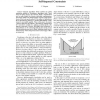Free Online Productivity Tools
i2Speak
i2Symbol
i2OCR
iTex2Img
iWeb2Print
iWeb2Shot
i2Type
iPdf2Split
iPdf2Merge
i2Bopomofo
i2Arabic
i2Style
i2Image
i2PDF
iLatex2Rtf
Sci2ools
CEC
2007
IEEE
2007
IEEE
Designing memetic algorithms for real-world applications using self-imposed constraints
— Memetic algorithms (MAs) combine the global exploration abilities of evolutionary algorithms with a local search to further improve the solutions. While a neighborhood can be easily defined for discrete individual representations, local search within real-valued domains requires an appropriate choice of the local search method. If the subject of optimization shows discontinuous behavior, a standard hill-climbing routine cannot be successfully applied. Thus, in this paper we present a general approach that defines a quasi-discrete neighborhood for real-valued variables by applying problem-specific selfimposed constraints. Thereby, knowledge about properties of good solutions can be easily integrated into the search process and discontinuous parts can be found. Satisfying results can be obtained faster while all important issues in the design of MAs are preserved.
Artificial Intelligence | CEC 2007 | Discrete Individual Representations | Global Exploration Abilities | Local Search |
| Added | 07 Dec 2010 |
| Updated | 07 Dec 2010 |
| Type | Conference |
| Year | 2007 |
| Where | CEC |
| Authors | Thomas Michelitsch, Tobias Wagner, Dirk Biermann, C. Hoffmann |
Comments (0)

